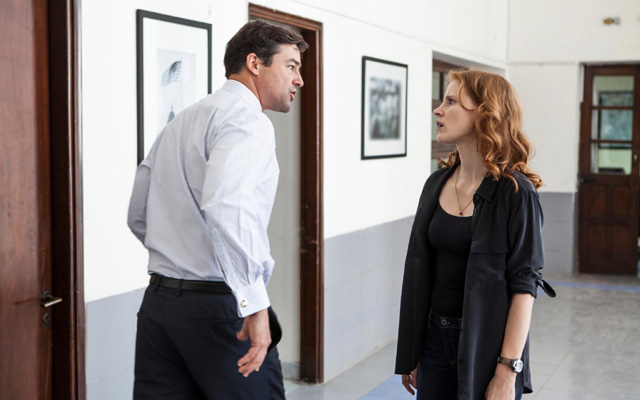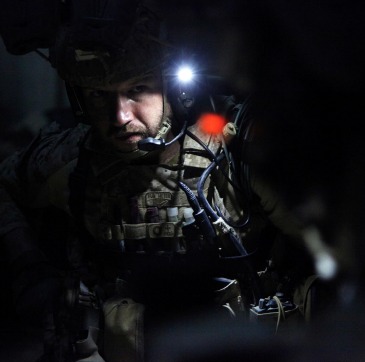Why Does Everybody Keep Talking About Zero Dark Thirty?
By Steven Pate in Arts & Entertainment on Jan 8, 2013 10:00PM
 There's this movie called Zero Dark Thirty, maybe you've heard something about it? Perhaps you heard how Walt's dad from LOST shows up early on (as the spirit animal of red herrings)? Or perhaps that coach Eric Taylor from Friday Night Lights appears as the father-figure-you-don't-want-to-disappoint-but-must-rebel-against? Or that Tony Soprano is the CIA Director? Maybe that Andy from Parks and Rec is like a totally badass Navy Seal? Perhaps someone tipped you off that Detective Jarek Wysocki from The Chicago Code is basically in every other scene, sporting various states of beardedness? That Stannis Baratheon pops up to drop some knowledge? That Betty Draper's constipated second hubby makes an important phone call?
There's this movie called Zero Dark Thirty, maybe you've heard something about it? Perhaps you heard how Walt's dad from LOST shows up early on (as the spirit animal of red herrings)? Or perhaps that coach Eric Taylor from Friday Night Lights appears as the father-figure-you-don't-want-to-disappoint-but-must-rebel-against? Or that Tony Soprano is the CIA Director? Maybe that Andy from Parks and Rec is like a totally badass Navy Seal? Perhaps someone tipped you off that Detective Jarek Wysocki from The Chicago Code is basically in every other scene, sporting various states of beardedness? That Stannis Baratheon pops up to drop some knowledge? That Betty Draper's constipated second hubby makes an important phone call?
Just kidding: what you heard about was torture.
A lot of people say that the film may glorify the practice, if only by not protesting it enough. Or maybe it misleadingly suggests its utility as an intelligence-gathering technique, according to some outraged senators. Just this Sunday, Jose A. Rodriguez Jr. took to the Washington Post editorial page to defend "enhanced interrogation" techniques he helped author and ostensibly opine about what the film got right and wrong about them. (We'll have to take his word, though, since he happens to be the very guy who destroyed the tapes and photos of the procedures.)
Just last night, director Kathryn Bigelow and screenwriter Mark Boal addressed the controversy directly, underscoring their position that "depiction is not endorsement." This was literally while the controversial feature snatched up still more awards (it recently picked up the heaviest hardware from the Chicago Film Critics Awards as well). Everywhere you turn, this film is on people's lips. Two nights ago, the Alabama football team supposedly watched the film "to get pumped up." What makes the telling of a story whose end we all know so fascinating?
 Zero Dark Thirty is an extraordinarily well-crafted film. It is grim and gripping, a mesmerizing showcase of things we normally want to turn away from. By beginning with the attacks of 9/11 and ending with the killing of that crime's mastermind, Bigelow affords us with the clean narrative arc that the rest of us, not single-mindedly focused on the hunt for Bin Laden, never had. To accomplish this, the events are told according to the strictures of the police procedural.
Zero Dark Thirty is an extraordinarily well-crafted film. It is grim and gripping, a mesmerizing showcase of things we normally want to turn away from. By beginning with the attacks of 9/11 and ending with the killing of that crime's mastermind, Bigelow affords us with the clean narrative arc that the rest of us, not single-mindedly focused on the hunt for Bin Laden, never had. To accomplish this, the events are told according to the strictures of the police procedural.
Jessica Chastain's CIA Analyst Maya is a fixated detective, obsessed with her unshakable hunch, blessed with intuition but imperfect interpersonal skills and an unwillingness to suffer fools or submit to authority. There are the setbacks and bureaucratic obstacles, there are the countless hours poring over evidence, there is even the shocking turn where she may as well have said out loud "now it's personal."
All this is executed so well that the film performs a neat trick: turning a quest by the world's largest superpower armed with the most powerful armed force ever assembled for a single individual into an underdog story. In this it truly reflects how we felt, vulnerable, and portrays our stand-in as how we wished to be: focused. Not distracted by politics or unrelated wars or economic woes, but laser-focused on finding the person responsible for a crime. This is a byproduct of eschewing triumphalism (anybody who doesn't think that antiwar movies can end up as pro-war propaganda should read about Walter Murch's experience of watching the "Ride of the Valkyries" sequence of Apocalypse Now he edited become misused as a pep rally for bloodshed) and, yes, of not shrinking from the fact that deplorable techniques were employed in our name in order to gather some of the data points which led to the theory that led to the clues that lead to the killing of Osama Bin Laden.
The graphic depiction of those interrogations is hard to watch. But resisting the urge to build a moral repulsion to them into the movie and leaving that to the audience gives Zero Dark Thirty some cathartic value. Even those of us who don't want torture to have occurred in our name cannot pretend it didn't, and cannot pretend that its commission is not now part of the larger story with which we must come to terms. What Larry Gross called the film's moral and ideological agnosticism is what makes this first take on history malleable enough to be useful as a first draft. There is plenty of time for the Oliver Stone, whose-side-are-you-on treatment later.
When Bigelow told the New Yorker that what they attempted was "almost a journalistic approach to film," she was referring to the fact that there was "no distance" between the telling of the tale and the event being told. And she's right: 19 months is not enough time to put everything into perspective. We are too close to these events and they are still to charged for us to create a remotely satisfyingly stab at an all-encompassing narrative of the Decade of Terror, of what we did and what was done to us. But we can start putting the pieces together in ways that help us talk about them more rather than less, which is what Bigelow and company have done.